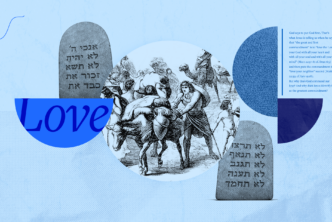By Charles C. Helmer IV
How are we to think theologically about our present social isolation? How might our time apart sharpen our understanding of the church? My intention here is to reflect briefly upon three theological insights from Bonhoeffer’s Life Together that may serve to hearten us in our experience living apart. None of what follows is intended to minimize the challenges the church now faces. Rather, it is to be reminded that the church is an eschatological community, united with Christ and born of and empowered by the Spirit. It is a community whose existence transcends present, worldly circumstances and a community over which the gates of hell will not prevail (Mt. 16:18). This present article suggests how I think Dietrich might consider our present ecclesiological crisis.
Our social isolation should cause us to think afresh about the church. For, while the uniqueness of this historical moment has been widely acknowledged, it is certainly not the first time Christians have been inhibited (or prohibited) from gathering together. Historically, these times apart have proven fertile ground for theological reflection on the nature of Christian community, fellowship, and what it means to be together. Indeed, if absence makes the heart grow fonder, it may, too, make the theologian’s mind dig deeper.
While the circumstances were radically different, it was a certain kind of prohibition that led to the establishment of the Confessing Church’s underground seminary at Finkenwalde, Germany. Directed by Dietrich Bonhoeffer, the seminary existed only two years before being shuttered by the Geheime Staatspolizei in 1937. Indeed, its origins and endings were the result of unique prohibitions on being together. Life apart, life together, and then life apart again. Such were the circumstances that gave rise to Bonhoeffer’s reflections in Gemeinsames Leben, published in 1938. Life Together, as it was later titled in the English edition (Harper Collins, 1954), is an extended biblical and theological reflection on Christian community, its foundation, functions, and responsibilities.
The gift of corporeal presence in community
Bonhoeffer begins his reflection on Christian community by declaring it a privilege for believers to live among other Christians. He emphasizes the goodness and the gift of corporeal presence. God created human beings with bodies. The Word became incarnate in a human body and was raised in a glorified body. In the Eucharist, we receive what Jesus declared his body. Indeed, bodies are good gifts. And dwelling together in those bodies is a great privilege. Bonhoeffer declares, “The physical presence of other Christians is a source of incomparable joy and strength to the believer.”1
For those reasons, he continues, it is good and right to long for the physical presence of others, as Paul did for Timothy (2 Tim. 4:9). Indeed, yearning for the physical presence of others is a yearning for a God-created good, a yearning for God’s good ordering of his world. By this measure, it feels as though much has been lost in our present circumstances.
Perhaps for the first time on a truly global scale, Christians are being confronted with this yearning, collectively. Bonhoeffer reminds us that the yearning is a good one. And this new yearning serves to increase our appreciation for the gift.
Put another way, “It is true, of course, that what is an unspeakable gift of God for the lonely individual is easily disregarded and trodden under foot by those who have the gift every day. It is easily forgotten that the fellowship of Christian brethren is a gift of grace, a gift of the Kingdom of God that any day may be taken from us…”2
There will be a time when Christians gather together again. What fingerprints COVID-19 will leave behind are yet to be determined. Things will look different. One hoped for difference will be that God’s gracious gift of our corporeal presence together will not be too quickly forgotten.
Life apart makes us yearn for life together. And yet, in our distance, not everything has been lost.
The sufficiency of Christ for our community
If the church is, to use Paul’s favorite metaphor, Christ’s body, it need not cease being so simply on account of distance. Indeed, the one, holy, catholic, and apostolic church is constituted by those united to Christ. It is a community made up of the living and the dead, the near and the far. It is no less that community in its distance, and Bonhoeffer supplies the theological rationale for that truth.
“Our community with one another,” he insists, “consists solely in what Christ has done to both of us. This is true not merely at the beginning, as though in the course of time something else were to be added to our community; it remains so for all the future and to all eternity. I have community with others and I shall continue to have it only through Jesus Christ. The more genuine and the deeper our community becomes, the more will everything else between us recede, the more clearly and purely will Jesus Christ and his work become the one and only thing that is vital between us.”3
Even in our distance, Christians have not lost what unites them together. By this measure, very little has been lost. For the body of Christ is no less so for being at a distance. Our unity as a body is contingent upon what Christ has already done in and for us. Together, we still have Christ, and he still has us. What more could we need?
Life apart remains life together.
Bonhoeffer goes on to pointedly emphasize the sufficiency of Christ for our community. The Christ-constituted community that we have, he declares, “dismisses once and for all every clamorous desire for something more. One who wants more than what Christ has established does not want Christian brotherhood. He is looking for some extraordinary social experience which he has not found elsewhere; he is bringing muddled and impure desires into Christian brotherhood. Just at this point Christian brotherhood is threatened most often at the very start by the greatest danger of all, the danger of being poisoned at its root, the danger of confusing Christian brotherhood with some wishful idea of religious fellowship, of confounding the natural desire of the devout heart for community with the spiritual reality of Christian brotherhood.”4
Here we have a word of caution. Bonhoeffer would hardly deny the reality of losses from our “social distancing”. But our distance from each other is an occasion for critical reflection on what it is we really yearn for and miss the most. Do we miss Christian community or something more syncretistic? What “muddled and impure desires” surface during this time of distance? Are we longing for an “extraordinary social experience” or for “some wishful idea of religious fellowship”? Thankfully, Bonhoeffer does not provide examples, lest we too easily dismiss his caution as the problems of others. Rather, the general warning invites further self-reflection. Do we long for what Christ has established, or do we crave something extra?
Life apart refines our desires for life together.
The divine reality of our community
Christ’s church remains his church, whether it be gathered or scattered. It is a community already realized by the work of Christ and the Spirit. It is a divine and eschatological reality, created by God, and it remains so with indifference to our physical proximity. The reality of our community, its establishment in the eternal plan of God, ought then to characterize our disposition toward God and toward one another.
“Because God has already laid the only foundation of our fellowship, because God has bound us together in one body with other Christians in Jesus Christ, long before we entered into common life with them, we enter into that common life not as demanders but as thankful recipients. We thank God for what He has done for us. We thank God for giving us brethren who live by His call, by His forgiveness, and His promise. We do not complain of what God does not give us; we rather thank God for what He does give us daily.”5
Even in our isolation, we live as members of a divine reality, a community made real by God through Christ and by the Spirit. Thus, even as we yearn for corporeal presence, we yearn with hearts of gratitude. While we are experiencing loss, we dare not make demands. For we have not lost the divine reality that makes the church the church, and we must, then, not be short on joyful gratitude.
What has been lost? No shortage of liturgical practices, cultural habits, formative routines—all things that have shaped us into particular kinds of people and communities. What have we retained? All that makes the church the church: Jesus Christ.
Whether life apart or life together, we give thanks.






